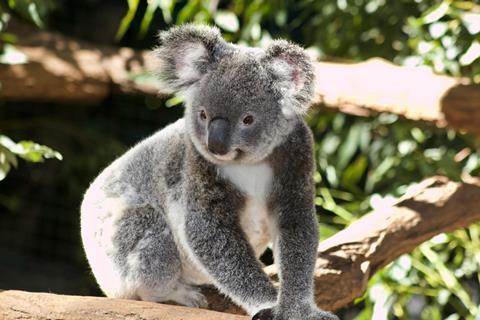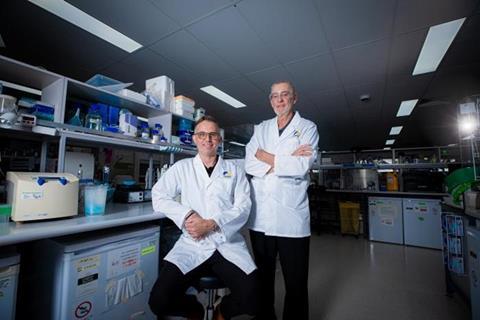In a world first, a vaccine has been approved to protect Australia’s endangered koalas from infection and death caused by chlamydia.

Developed by the University of the Sunshine Coast, the vaccine’s approval by Australia’s veterinary medicine regulator is a major step in the fight against one of the greatest threats to the long-term survival of the nation’s iconic marsupial.
READ MORE: Isolated population of chlamydia-free koalas even more vulnerable to the disease
READ MORE: Booster shot being developed to fight koala Chlamydia
Led by Professor of Microbiology Peter Timms, University of the Sunshine Coast researchers have spent more than 10 years developing the vaccine to protect koalas from the disease which can cause painful urinary tract infections, infertility, blindness and even death.
Edging closer to extinction
“UniSC knew a single-dose vaccine – without the need for a booster - was the answer to reducing the rapid, devastating spread of this disease, which accounts for as much as half of koala deaths across wild populations,” Professor Timms said.
“Some individual wild colonies, where infection rate can be as high as 70 percent, are edging closer to extinction every day.
“We were determined to do the hard yards to move from research to this vital next stage – a high-quality, veterinary-approved product that can now be used in wildlife hospitals, veterinary clinics and in the field to protect the nation’s most at-risk koalas.”
Until now, antibiotics were the only treatment available for infected koalas, but they can disrupt a koala’s ability to digest eucalyptus leaves – its sole source of food – leading to starvation and, in some cases, death. They also often fail to prevent future infection, leaving populations vulnerable.
Koala lifeline
A decade of clinical data, gathered through multiple vaccination trials, confirmed the vaccine’s safety and effectiveness. This includes the largest and longest-ever study of wild koalas, led by UniSC Senior Researcher Dr Sam Phillips.

“This study found it reduced the likelihood of koalas developing symptoms of chlamydia during breeding age and decreased mortality from the disease in wild populations by at least 65 percent,” Dr Phillips said.
“The vaccine has been trialled on hundreds of wild koalas, others in captivity and wildlife hospitals, and over multiple generations.” Dr Philips said.
“It’s based on Chlamydia pecorum’s major outer membrane protein (MOMP), and offers three levels of protection – reducing infection, preventing progression to clinical disease, and, in some cases, reversing existing symptoms.”
Global response to koala’s plight
UniSC drew upon the expertise and resources of global and national partners and supporters to advance the vaccine development.
It uses an adjuvant originally developed by the University of Saskatchewan’s Vaccine and Infectious Disease Organization (VIDO), the International Vaccine Institute, the University of British Colombia and Dalhousie University, with funding from the Bill and Melinda Gates Foundation.
Other collaborators include Morris Animal Foundation, Rane Pharma, Canada and global animal health company Ceva Santé Animale who leveraged complementary expertise to overcome hurdles to help bring the project to its final stages. It also provided funding through its Ceva Wildlife Research Fund.
Unique heritage
Ceva Wildlife Research Fund Director Pierre-Marie Borne said the koala symbolised a unique aspect of Australia’s natural heritage, and its conservation was of global significance.
“Moreover, the vaccine’s design emphasises operational feasibility, requiring a single-dose administration, which is critical in wildlife management to minimise handling stress and logistical constraints for field teams,” he said.
“Ceva WRF takes great pride in supporting this work.
“This initiative transcends basic research; it represents a crucial intervention to safeguard endangered species and maintain ecological balance in Australia’s unique environments, serving as a model for similar conservation efforts worldwide.”
Real-world conditions
Wildlife Warrior and conservationist, Dr Terri Irwin AM, said the Australia Zoo Wildlife Hospital was honoured to contribute to trials of a potential vaccine for koalas affected by chlamydia.
“These trials involved vaccinating koalas in real-world conditions, enabling researchers to gather valuable data on the vaccine’s potential benefits,” she said.
“This partnership has enabled us to combine scientific research with compassionate care by helping sick and injured koalas, while also raising awareness of the broader threats they face in the wild, including habitat loss.”
“Together, we are turning the tide for koalas, and Wildlife Warriors is proud to be part of this important work in wildlife conservation.”
Pressing challenges
UniSC Vice-Chancellor and President Professor Helen Bartlett said that the innovative vaccine development highlighted the University’s strategic focus on working collaboratively to find solutions to some of the world’s most pressing ecological and health challenges.
“This includes leading research in the rapid diagnosis and prevention of infectious diseases in humans and animals,” she said.
“This vaccine bridges the gap between discovery and real-world application, translating to a tangible, game-changing product that offers real hope for this endangered species.”
The vaccine is being produced in partnership with the independent Australian-owned animal health company Tréidlia Biovet, and was approved for production and distribution by the Australian Pesticides and Veterinary Medicines Authority.
Vital next steps
Professor Timms said here is still much more to be done – including sourcing major funding and donations to enable the national rollout of the approved vaccine at-risk koala populations.
“We are also continuing to refine the product and conduct ongoing research to ensure the vaccine’s long-term success.”







No comments yet